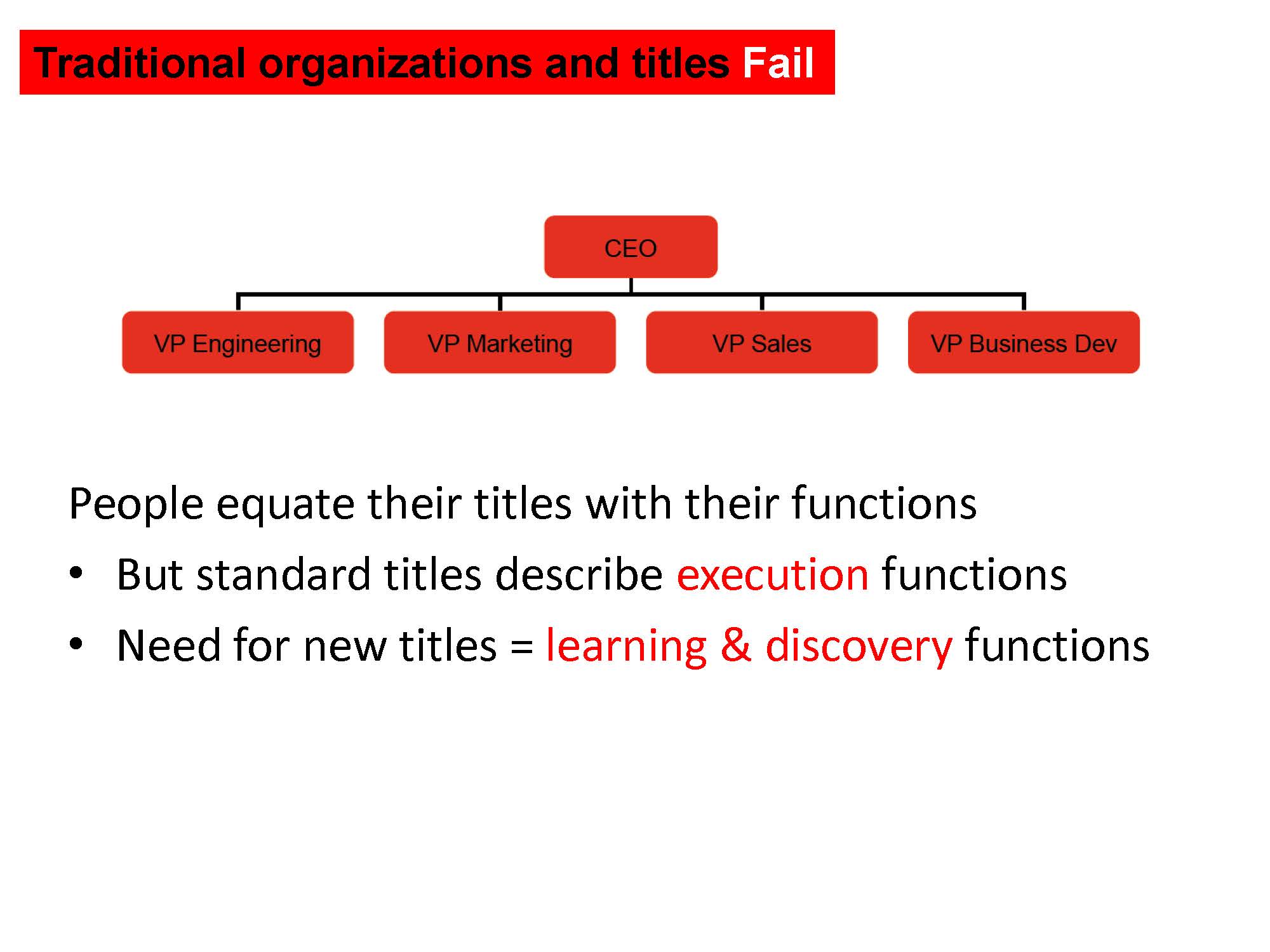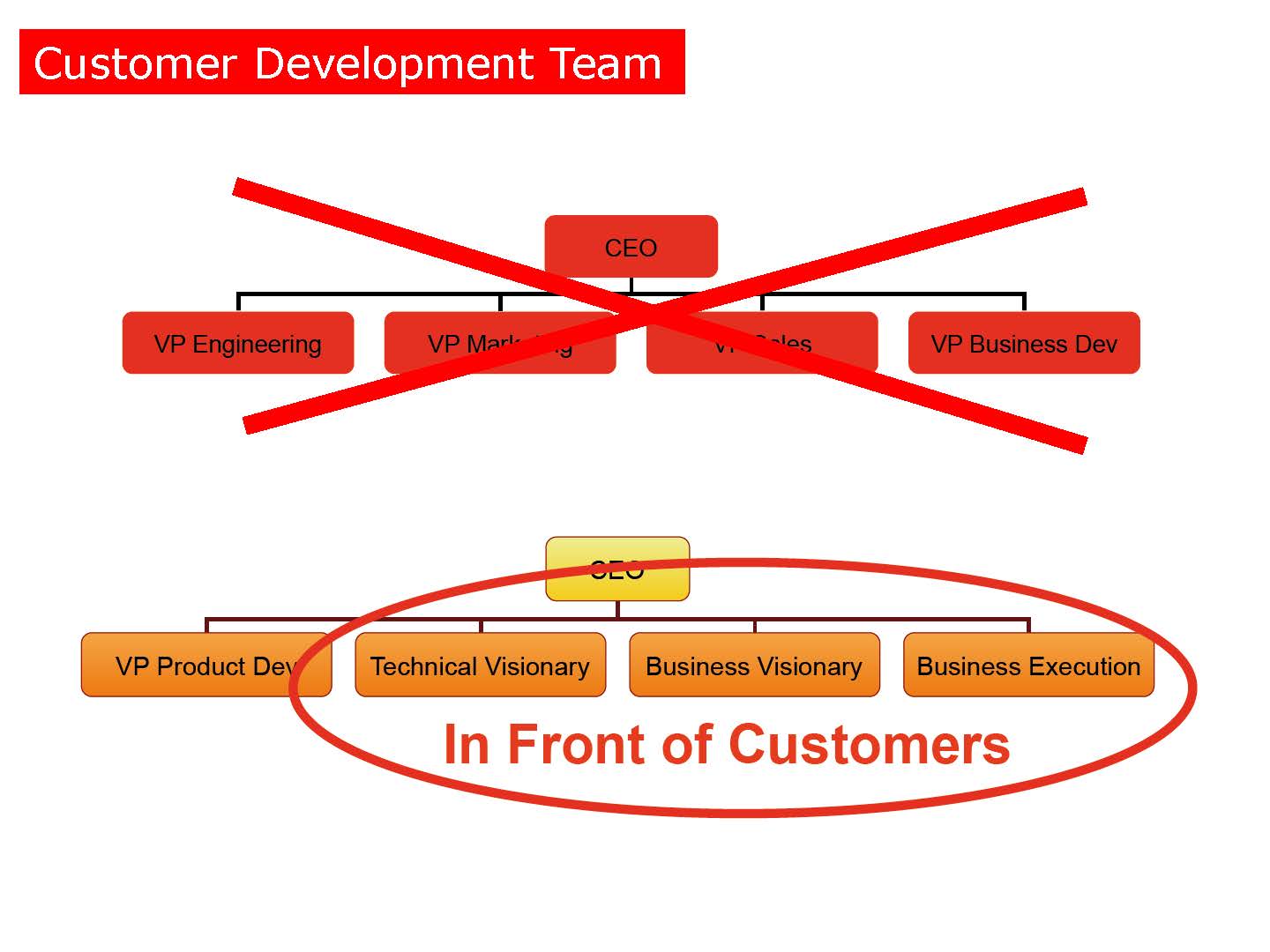I had a few days ago a conversation about why I thought titles such as CEO or CTO were not such a good idea in start-ups. I thought this was a close debate and apparently not. So let me try to elaborate.
A good quote – I just found trying to structure my thinking – is “CEO means in a startup Chief Everything Officer”! CTO means someone who does not want to interact with customers while Business Development means the opposite. But you would not use VP of Sales in a small team…
In the book Startup Nation, there is something similar: “The multitasking mentality produces an environment in which job titles — and the compartmentalization that goes along with them — don’t mean much.”
There are two articles worth reading: first, my favorite start-up guru, Steve Blank, Job Titles That Can Sink Your Startup. Second, Start-ups should eliminate job titles by Jeff Bussgang.
Steve Blank explains titles are for established companies with knwon business models and known processes: Companies Have Titles to Execute a Known Business Model. […] Therefore the job title “Sales” in an existing company is all about execution around a series of “knowns.” [For example] Did he have a repeatable and scalable business model? Did he have a well understood group of customers? […] Startups Need Different Titles to Search For an Unknown Business Model. You didn’t need a VP of Sales, you needed something very different. Searching around a series of unknowns. You needed a VP of Customer Development
I am not sure I am allowed to do the following but here is a long extract from Bussgang: “Job titles make sense for mature companies, not for start-ups. […] At business school, I learned all about titles and hierarchies and the importance of organizational structure. When I joined my first start-up after graduation, e-commerce leader Open Market, I found the operating philosophy of the founder jarring: He declared no one would have titles in the first few years. If you needed a title for external reasons, our founder told us, we should feel free to make one up. But we would avoid using labels internally. In other words, there would be no “vice-president” or “director” or other such hierarchical denominations.
Why? Because a start-up is so fluid, roles changes, responsibilities evolve and reporting structures move around fluidly. Titles represent friction, pure and simple, and the one thing you want to reduce in a start-up is friction. By avoiding titles, you avoid early employees getting fixated on their role, who they report to, and what their scope of responsibility is – all things that rapidly change in a company’s first year or two.
So when I co-founded Upromise, I instituted a similar policy. We had an open office structure and functional teams, but a fluid organizational environment and rapid growth. One of our young team members changed jobs four times in her first year. Only after the first year, as we settled into a more stable organizational structure and I recruited senior executives who were more obviously going to serve as my direct reports on the executive team did I begin to give out titles (CTO, CMO, CFO, etc.). But you can establish role and process clarity without having to depend on titles.
Here is Steve Blank visual summary of all this:


In his four steps to the epiphany, he adds a quick check list about this:
Goal of phase O-b: Set up the Customer Development Team. Agree on Customer Development team methodology and goals.
Author: Whoever is acting as CEO
Approval: Entire Founding Team/Board
Presenter: CEO
Time/Effort: 1/2-l day meeting of entire founding team
A- Review the organizational differences between Product and Customer Development – Traditional titles versus functional ones.
1. No VP of Sales
2. No VP of Marketing
3. No VP of Business Development
B-Identify the four key functional roles for the first four phases of a startup
1. Who is the Business Visionary
2. Who is the Business Execution
3. Who is the Technical Visionary
4. Who is the Technical Execution
C-Review the goals of each of the roles for each of the four Customer Development phases
D-Enumerate 3 to 5 Core Values of the Founding Team
1. Not a mission statement
2. Not about profit or products
3. Core ideology is about what the company believes in
Phase O-b Exit Criteria: Buy-in of the team and board for functional job descriptions, right people in those jobs, core values
PS: you may find more interesting advice from Steve Blank in
How To Find the Right Co-Founders? – https://steveblank.com/2014/09/16/who-do-you-need-on-your-startup-team/
Why Founders Should Know How to Code – https://steveblank.com/2014/09/03/should-founders-know-how-to-code/
Building Great Founding Teams – https://steveblank.com/2013/07/29/building-great-founding-teams/
and you may want to listen to Randy Komisar about entrepreneurship skills
PS2: I revisited my blog and saw the tag “team” was also relevant, direct link is here www.startup-book.com/tag/team/
